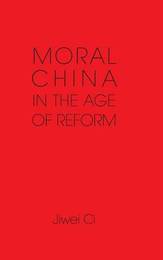
|
Moral China in the Age of Reform
Hardback
Main Details
| Title |
Moral China in the Age of Reform
|
| Authors and Contributors |
By (author) Jiwei Ci
|
| Physical Properties |
| Format:Hardback | | Pages:242 | | Dimensions(mm): Height 231,Width 152 |
|
| Category/Genre | Ethics and moral philosophy
Social and political philosophy |
|---|
| ISBN/Barcode |
9781107038660
|
| Classifications | Dewey:323.440951 |
|---|
| Audience | | Tertiary Education (US: College) | |
|---|
|
Publishing Details |
| Publisher |
Cambridge University Press
|
| Imprint |
Cambridge University Press
|
| Publication Date |
11 August 2014 |
| Publication Country |
United Kingdom
|
Description
Three decades of dizzying change in China's economy and society have left a tangible record of successes and failures. Less readily accessible but of no less consequence is the story, as illuminated in this book, of what China's reform has done to its people as moral and spiritual beings. Jiwei Ci examines the moral crisis in post-Mao China as a mirror of deep contradictions in the new self as well as in society. He seeks to show that lack of freedom, understood as the moral and political conditions for subjectivity under modern conditions of life, lies at the root of these contradictions, just as enhanced freedom offers the only appropriate escape from them. Rather than a ready-made answer, however, freedom is treated throughout as a pressing question in China's search for a better moral and political culture.
Author Biography
Jiwei Ci is Professor of Philosophy at the University of Hong Kong and the author of Dialectic of the Chinese Revolution: From Utopianism to Hedonism (1994) and The Two Faces of Justice (2006).
Reviews'Jiwei Ci's remarkable book presents a gripping picture of contemporary China's moral chaos and political vulnerability. He offers a deep diagnosis of the sources and character of China's increasingly obtrusive and painfully felt moral crisis and makes clear how desperately difficult that crisis will be to resolve. He places residual hope in the imaginative resources of China's ancient commitment to a very concrete conception of the good and in the possible political commitment of the ruling party to revive some viable interpretation of that ancient commitment's implications, which together level a bracing challenge to assess China's political plasticity.' John Dunn, University of Cambridge 'Jiwei Ci accomplishes two things in his splendid new book. First, he goes beyond the account of his seminal Dialectic of the Chinese Revolution (1994) to explore the causes and effects of the moral crisis that has accompanied China's three decades of post-Mao reform. Second, he uses this analysis as the foundation for theories of freedom and human agency - theories that are deeply revealing not just of the possibilities and challenges faced by Chinese citizens, but also of the human condition more generally.' Stephen C. Angle, Wesleyan University 'Writing in an elegant and persuasive style, Ci artfully connects China's moral crisis with perennial questions regarding freedom, which are profoundly addressed from the perspectives of general philosophy and ethics. The outcome is a superb piece of work that should not be missed by not only scholars of China or Asia but also scholars of ethical and political philosophy, who will find it substantively helpful, as well.' Xingzhong Yu, Anthony W. and Lulu C. Wang Professor in Chinese Law, Cornell University Law School 'This thought-provoking volume by Ci seeks to examine the moral crisis in post-Mao China by treating it as a mirror of the deep contradictions created in the subject as well as in society ... The author suggests that the positive future of China depends ... on full cognizance of what it means to live under modern conditions of liberty, and such cognizance involves both acceptance of liberty as constitutive of modern life and awareness of its moral and political liabilities in the absence of a dialectical relation with the good ... Summing up: recommended.' S. K. Ma, Choice
|